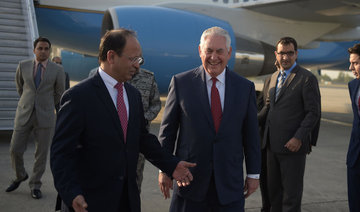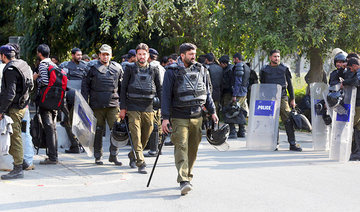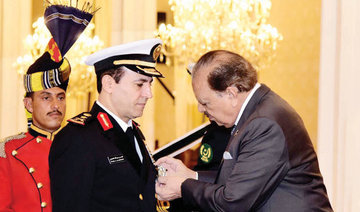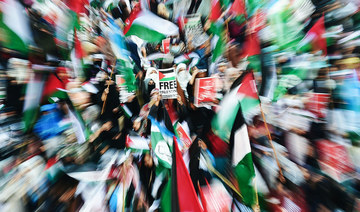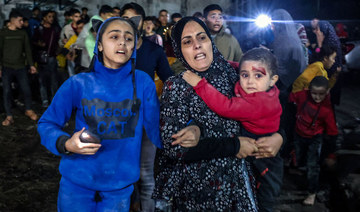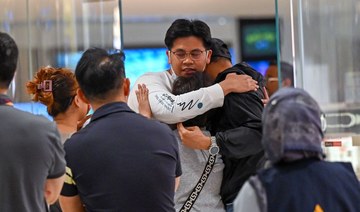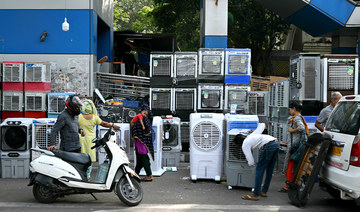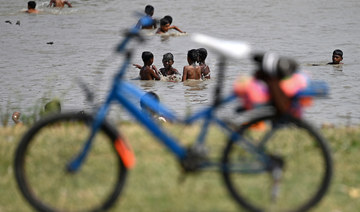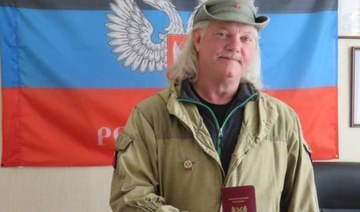ISLAMABAD: Pakistani Prime Minister Shahid Khaqan Abbasi on Monday said his government will push ahead with plans to seize control of charities run by an Islamist designated a terrorist by Washington, and warned the United States not to weaken Pakistan.
Abbasi brushed off US President Donald Trump’s recent tweet accusing Pakistan of “lies and deception” in its commitment to fighting terrorism, as he raised the prospect of charging the United States to use Pakistan’s airspace to resupply NATO troops in Afghanistan.
Under pressure from the United States and international institutions to crack down on terrorist financing, Pakistan last month drew up secret plans for a “takeover” of charities linked to Islamist leader Hafiz Saeed, who Washington blames for the 2008 attacks in Mumbai that killed 166 people.
The United States has labelled the charities Jamaat-ud-Dawa (JuD) and the Falah-e-Insaniat Foundation (FIF) as “terrorist fronts” for Lashkar-e-Taiba (LET), or “Army of the Pure,” a group Saeed founded in 1987 and which Washington and India accuse of carrying out the Mumbai attacks.
Saeed has repeatedly denied involvement in the Mumbai attacks and says the charitable organizations he founded and controls have no ties with militants.
But both he and the organizations have been sanctioned by the United Nations and his freedom in Pakistan, where he holds public rallies, has been a thorn in Islamabad’s relations with India and the United States.
“Yes, the government will take over the charities which are sanctioned and not allowed to operate,” Abbasi, 59, told Reuters in an interview at the prime minister’s chamber in Pakistan’s Parliament in capital Islamabad.
Answering specific questions about the proposed takeover of JuD and FIF, Abbasi said the civilian government had the backing of the powerful military, which effectively controls Pakistan’s security and foreign policy.
“Everybody is on board, everybody is on the same page, everybody is committed to implementation of UN sanctions,” he said.
He declined to set a deadline.
JuD and FIF did not respond to Reuters requests for comment. The organizations have previously said they would take legal action if the government tried to take them over. Saeed could not be reached for comment.
Selective action
There are concerns in Pakistan that the country may face financial sanctions over accusations of selective action against Islamist militant groups and financing.
Pakistan is a base for myriad Islamist movements, and critics accuse Islamabad of only targeting militants who attack the state while leaving unscathed those who target neighboring Afghanistan and arch-foe India. Pakistan denies those allegations.
Abbasi said Pakistan had made progress in curbing terrorist financing after meetings with the Financial Action Task Force (FATF), an international body that warned Islamabad could be put on a watchlist for not doing enough to stop the practice.
“We’ve had several meetings on that, and from what I’ve seen a large part of those actions have been taken,” Abbasi said.
A UN Security Council team is due to visit Pakistan this month to review progress against UN-designated “terrorist” groups, which includes LeT and others such as the Afghan Taliban-allied Haqqani network.
Former petroleum minister Abbasi said any sanctions against Pakistan would be counter-productive to the country’s own battle against Islamist militants, which he called “the largest war on terror in the world.”
“Any constraints put on Pakistan, actually only serve to degrade our capability to fight the war against terror,” he said.
Trump meeting
Relations between the United States and its uneasy ally have frayed since Jan. 1, when Trump lashed out against what he called Pakistan’s “lies and deceit” over its alleged support of Afghan Taliban militants battling US troops in Afghanistan. Washington has since suspended aid totalling about $2 billion.
Abbasi said Trump’s tweet was “unacceptable” in its tone and that Pakistan should not be “scapegoated” for US failures in Afghanistan.
“That is something ... we cannot accept because nobody’s suffered more than Pakistan,” Abbasi said, adding that tens of thousands of Pakistani have died from militancy that has inflicted damage worth $120 billion to the economy.
US officials last year warned of tougher measures against Pakistan, including potentially withdrawing its “non-Nato ally” status or even designating it a state sponsor of terrorism.
Abbasi said much of the suspended aid was from the Coalition Support Fund (CSF), a US Defense Department program to reimburse allies for the costs of supporting counter-terrorist and counter-insurgency operations.
He said the US needed to respect Pakistan’s contribution to the fight against Islamist militancy and raised the prospect of charging Washington for air transport flights that have been resupplying US-led troops and Afghan forces in landlocked Afghanistan.
“If somebody wants to start quantifying expenses and aid, I think let’s put this on the table also. Let’s discuss that,” Abbasi said, though he added that such talk was “hypothetical.”
Abbasi dismissed media reports that Islamabad has ended intelligence sharing with the US military as false.
And he also spoke fondly about a brief discussion he had with Trump in September at a reception at the UN General Assembly in New York.
“I found him to be fairly warm,” he said. “Somebody that you would like to engage with and talk to.”
Pakistani PM says ‘committed’ to seizing Islamist charities
Pakistani PM says ‘committed’ to seizing Islamist charities

Germany, Portugal say time not ripe to recognize Palestinian state
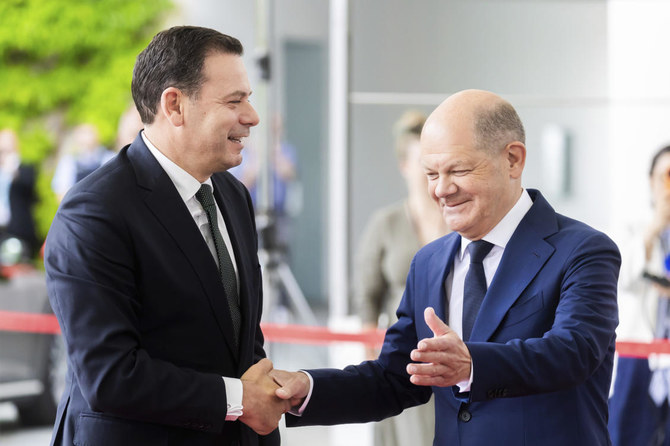
- “There is no clarity about the territory of the state and other questions related to it,” Scholz said
- Montenegro said Portugal was also “not in the position to” recognize a Palestinian state
BERLIN: The leaders of Germany and Portugal said Friday the time was not ripe to recognize a Palestinian state, after three other European nations announced plans to do so.
“We have no reason to recognize the Palestinian Authority as a separate state now,” Chancellor Olaf Scholz told a press conference after talks with Portuguese Prime Minister Luis Montenegro.
“There is no clarity about the territory of the state and other questions related to it,” he said.
“What we need is a negotiated solution between Israel and the Palestinians that amounts to a two-state solution... but we are still a long way from there,” he said.
“Symbolic recognition of statehood does not bring us further” toward the goal, he added.
Speaking at the same press conference, Montenegro said Portugal was also “not in the position to” recognize a Palestinian state.
“We are waiting for the (related) issues to be further discussed within the European Union,” he added.
Ireland, Norway and Spain on Wednesday announced they intended to recognize the State of Palestinian next week.
The announcement drew fury from Israel, which warned of “serious consequences” for ties with the European nations.
For decades, formal recognition of a Palestinian state has been seen as the end goal of a peace process between Palestinians and Israel.
The United States and most western European nations have said they are willing to one day recognize Palestinian statehood, but not before agreement is reached on thorny issues like final borders and the status of Jerusalem.
Top UN court orders Israel to halt military operation in Rafah, Israel is unlikely to comply
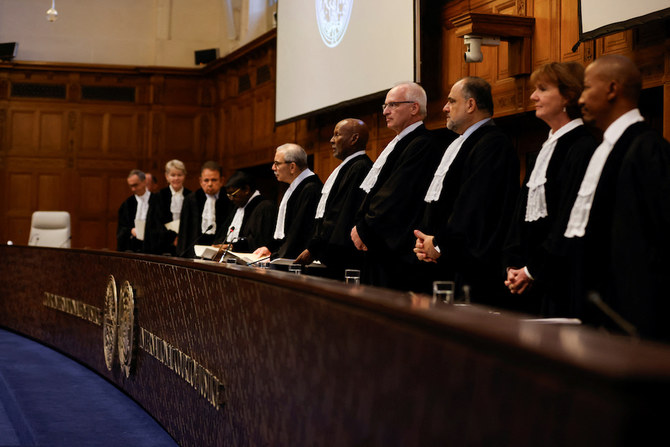
- The ICJ order further ratchets up international pressure on an increasingly isolated Israel to rein in its war on Hamas in Gaza
- Friday’s decision marked the third time this year the 15-judge panel has issued preliminary orders seeking to rein in the death toll and alleviate humanitarian suffering in Gaza
THE HAGUE: The top United Nations court has ordered Israel to halt its military operations in the southern Gaza city of Rafah. Israel insists it has the right to defend itself from Hamas militants and is unlikely to comply with the ruling.
The order by the International Court of Justice further ratchets up international pressure on an increasingly isolated Israel to rein in its war on Hamas in Gaza.
Friday’s decision marked the third time this year the 15-judge panel has issued preliminary orders seeking to rein in the death toll and alleviate humanitarian suffering in Gaza.
While orders are legally binding, the court has no police to enforce them.
Earlier Friday, the ICJ opened its hearing to rule on the request to order Israel to halt its military operation in Gaza and withdraw from the enclave.
Criticism of Israel’s conduct in the war in Gaza has been growing — even from its closest ally, the United States, which warned against an invasion of the southern city of Rafah, where hundreds of thousands of Palestinians have sought shelter from fighting elsewhere. And this week alone, three European countries announced they would recognize a Palestinian state, and the chief prosecutor for another UN court requested arrest warrants for Israeli leaders, along with Hamas officials.
Israeli Prime Minister Benjamin Netanyahu is also under heavy pressure at home to end the war, which was triggered when Hamas-led militants stormed into Israel, killing 1,200 people, most civilians, and taking some 250 captive. Thousands of Israelis have joined weekly demonstrations calling on the government to reach a deal to bring the hostages home, fearing that time is running out.
While the International Court of Justice has broad powers to order an end to the Israeli military campaign and any such ruling would be a blow to Israel’s international standing, it does not have a police force to enforce its orders. In another case on its docket, Russia has so far ignored a 2022 order by the court to halt its full-scale invasion of Ukraine.
Israel signaled it, too, would brush off an ICJ order to stop its operations. “No power on earth will stop Israel from protecting its citizens and going after Hamas in Gaza,” Avi Hyman, the government spokesperson, said in a press briefing Thursday.
The court’s president, Nawaf Salam, opened Friday’s hearing, as a small group of pro-Palestinian protesters demonstrated outside.
The ceasefire request is part of a case filed late last year by South Africa accusing Israel of committing genocide during its Gaza campaign. Israel vehemently denies the allegations. The case will take years to resolve, but South Africa wants interim orders to protect Palestinians while the legal wrangling continues.
At public hearings last week at the International Court of Justice, South Africa’s ambassador to the Netherlands, Vusimuzi Madonsela, urged the panel of 15 international judges to order Israel to “totally and unconditionally withdraw” from the Gaza Strip.
The court has already found that Israel’s military operations pose a “real and imminent risk” to the Palestinian people in Gaza.
Israel’s offensive has killed more than 35,000 Palestinians, according to Gaza’s Health Ministry, which does not distinguish between combatants and civilians. The operation has obliterated entire neighborhoods, sent hundreds of thousands of people fleeing their homes, and pushed parts of the territory into famine.
“This may well be the last chance for the court to act,” Irish lawyer Blinne Ní Ghrálaigh, who is part of South Africa’s legal team, told judges last week.
Israel rejects the claims by South Africa, a nation with historic ties to the Palestinian people.
“Israel takes extraordinary measures in order to minimize the harm to civilians in Gaza,” Tamar Kaplan-Tourgeman, a member of Israel’s legal team, told the court last week.
In January, ICJ judges ordered Israel to do all it can to prevent death, destruction and any acts of genocide in Gaza, but the panel stopped short of ordering an end to the military offensive. In a second order in March, the court said Israel must take measures to improve the humanitarian situation.
The ICJ rules in disputes between nations. A few kilometers (miles) away, the International Criminal Court files charges against individuals it considers most responsible for war crimes, crimes against humanity and genocide.
On Monday, its chief prosecutor, Karim Khan, said he has asked ICC judges to approve arrest warrants for Netanyahu, Defense Minister Yoav Gallant and three top Hamas leaders — Yahya Sinwar, Mohammed Deif and Ismail Haniyeh — of war crimes and crimes against humanity in the Gaza Strip and Israel.
Israel is not an ICC member, so even if the arrest warrants are issued, Netanyahu and Gallant do not face any immediate risk of prosecution. But the threat of arrest could make it difficult for the Israeli leaders to travel abroad.
Passengers had seconds to react as turbulence hit Singapore flight

- Passengers and crew on the flight sustained skull, brain, and spine injuries as they were tossed violently around the cabin
- The flight carrying 211 passengers and 18 crew was forced to make an emergency landing in Bangkok
BANGKOK: A Malaysian woman whose six relatives and a friend were injured on a Singapore Airlines flight hit by deadly turbulence this week said on Friday they had only seconds to react before the plane started to plunge.
One passenger died and more than 100 were injured when the Boeing 777-300ER fell 1,800 meters (6,000 feet) in just a few minutes during the final hours of its journey from London to Singapore on Tuesday.
Passengers and crew on the flight sustained skull, brain, and spine injuries as they were tossed violently around the cabin.
The flight carrying 211 passengers and 18 crew was forced to make an emergency landing in Bangkok, where at least 48 people are still being treated in hospital.
Eva Khoo, who prayed for her family at the Erawan Shrine in the Bangkok city center on Friday, said she was desperately concerned for her pregnant sister-in-law.
“My sister-in-law had to have surgery on her spine,” she told AFP.
“I am really worried because she is pregnant.”
The family was returning from a two-week holiday in Switzerland and Britain.
Khoo said her brother was still in pain after the high-altitude ordeal.
“His hand is in pain and still numb,” she said.
“He couldn’t carry anything. He still needs a wheelchair to move him around.”
She said four of her relatives who were on the flight were treated in intensive care at a Bangkok hospital.
“Some of them are still in bed and can’t be moved,” she said.
Her brother told her that the seatbelt sign was off and the situation was “very calm” when the turbulence hit.
“They were serving food and collecting rubbish and suddenly the plane was shaking and my brother and his wife were sitting without (a) seatbelt,” she said.
“They felt the vibration and the shaking, they wanted to fasten the seatbelt, but (they) only (had) a few seconds.”
Her brother “flew away” and hit the floor while he was trying to fasten his belt, she said.
Her sister-in-law flew up and dropped onto a seat in the plane.
She said a family friend who was on the flight had fastened his seatbelt but still sustained a neck injury and will have to use back support for at least six months.
The plane was met at Bangkok’s Suvarnabhumi Airport by emergency responders who used gurneys to ferry the injured to ambulances waiting on the tarmac.
Photos taken inside the plane after it landed in Bangkok show the cabin in chaos, strewn with food, drinks and luggage, and with oxygen masks dangling from the ceiling.
Singapore Airlines chief executive Goh Choon Phong has apologized for the “traumatic experience” and expressed condolences to the family of the deceased — a 73-year-old British man.
The carrier said on Friday it has tightened seatbelt rules on its flights after the incident and that it has introduced a “more cautious approach” to turbulence.
Investigators are analizing cockpit data — including the voice recorder — as they seek to understand the cause of the deadly incident.
Air safety experts have told AFP that passengers are often too casual about wearing seatbelts, leaving them at risk if the plane hits unexpected turbulence.
Scientists also warn that so-called clear air turbulence, which is invisible to radar, is getting worse because of climate change.
Parts of India boil as temperatures near 50 C
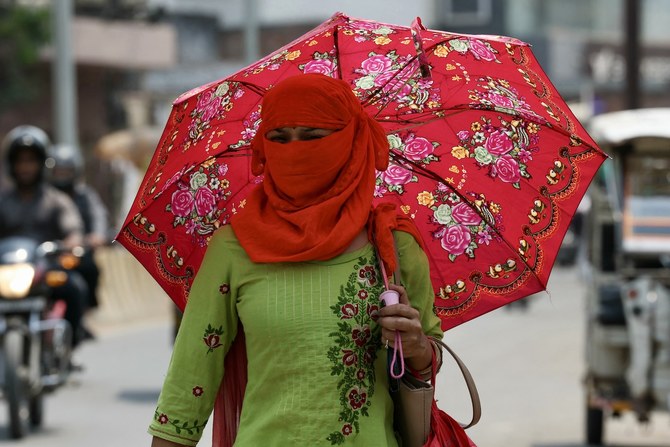
- Delhi and neighboring states are on ‘red alert’ over increasing heat
- Doctors observe a 30 percent jump in heat-related cases in Rajasthan
NEW DELHI: Parts of India continued to reel under a prolonged extreme heat spell on Friday, with temperatures in northern regions expected to soar to nearly 50 degrees Celsius over the weekend.
India’s summer temperatures often peak in May, but heatwave days have been more severe than usual this year.
The Delhi capital region and the nearby states of Punjab, Haryana, Rajasthan, Chandigarh and Uttar Pradesh have been under the India Meteorological Department’s “red alert” — its highest warning — since Wednesday.
Temperatures soared beyond 45 C in many of the regions and touched 48.8 C in Rajasthan’s Barmer city on Thursday — the highest temperature recorded in the country this year so far, which was forecast to increase even further in the coming days.
“The situation has been grim. There is a heatwave in large parts, and it is severe in some pockets in Rajasthan and parts of Punjab and Haryana, and (it’s) likely to continue till the month’s end,” G.P. Sharma, chief forecaster at Skymet, India’s leading weather and agriculture risk consultancy, told Arab News.
“There is going to be no letup in western Uttar Pradesh and Rajasthan and Gujarat … They will have extreme temperatures, reaching about 49 degrees.”
IMD data showed that temperatures in Rajasthan may cross 49.6 C on Sunday.
Devi Singh, a tourism professional working in the state said one had to “feel it to believe” that it could be this hot.
“The heat is too much and people are really suffering,” she told Arab News. “Life has almost come to a standstill. Business has suffered. Very few tourists are coming. In this heat, people don’t want to venture out.”
Not venturing out is also what doctors advise their patients as they observe a rise in heat-related cases.
“We advise them not to leave home after 10 a.m. in the morning, and leave home only after 5 p.m. Even if you have to step out during the daytime, hydrate yourself properly … Consult doctors immediately if you have any symptoms,” said Dr. Vikas Chowdhury from the Thar Hospital in Barmer city.
“There has been an increase of at least 30 percent in patients with heatwave conditions like dryness of throat, dehydration, vomiting, decrease in appetite, a burning sensation and fever.”
Many Indians, however, have to be outside for work.
“I’ve been feeling dizzy because of the heat,” said Shivam Kumar, a cameraman in Delhi, as he prepared to cover the fifth phase of the ongoing general election, which will be held in the capital on Saturday.
“I have to work anyway because inflation is so high. I have to work to survive, as there is so much unemployment.”
American soldier arrested in Russia over an alleged theft will remain in custody, state media report
American soldier arrested in Russia over an alleged theft will remain in custody, state media report

- The soldier, identified by court officials as Gordon Black, will remain in custody at least until July 2
- Officials said that Black, who is married, traveled to Russia to see a longtime girlfriend
MOSOCW: An American soldier arrested in Russia’s far eastern city of Vladivostok on charges of stealing lost an appeal against his detention and will remain in custody, Russian state news agency RIA Novosti reported Friday, citing court officials.
The soldier, identified by court officials as Gordon Black, will remain in custody at least until July 2, the report said, after the Primorsky Regional Court upheld the lower court’s ruling to place Black in custody pending investigation and trial.
Several US officials said earlier this month that Black, a 34-year-old staff sergeant, was stationed in South Korea and was in the process of returning home to Fort Cavazos in Texas. Instead, officials said that Black, who is married, traveled to Russia to see a longtime girlfriend. He was detained in Vladivostok, a major military and commercial Pacific port in Russia’s Far East, and accused of stealing from her.
RIA Novosti said, citing local police, that Black has admitted guilt and is cooperating with investigators.
Black’s arrest further complicates US relations with Russia, which have grown increasingly tense as the war in Ukraine drags on.
Russia is known to be holding a number of Americans in its jails, including corporate security executive Paul Whelan and Wall Street Journal reporter Evan Gershkovich. The US government has designated both as wrongfully detained and has been trying to negotiate for their release.
Others detained include Travis Leake, a musician who had been living in Russia for years and was arrested last year on drug-related charges; Marc Fogel, a teacher in Moscow, who was sentenced to 14 years in prison, also on drug charges; and dual nationals Alsu Kurmasheva and Ksenia Khavana.


